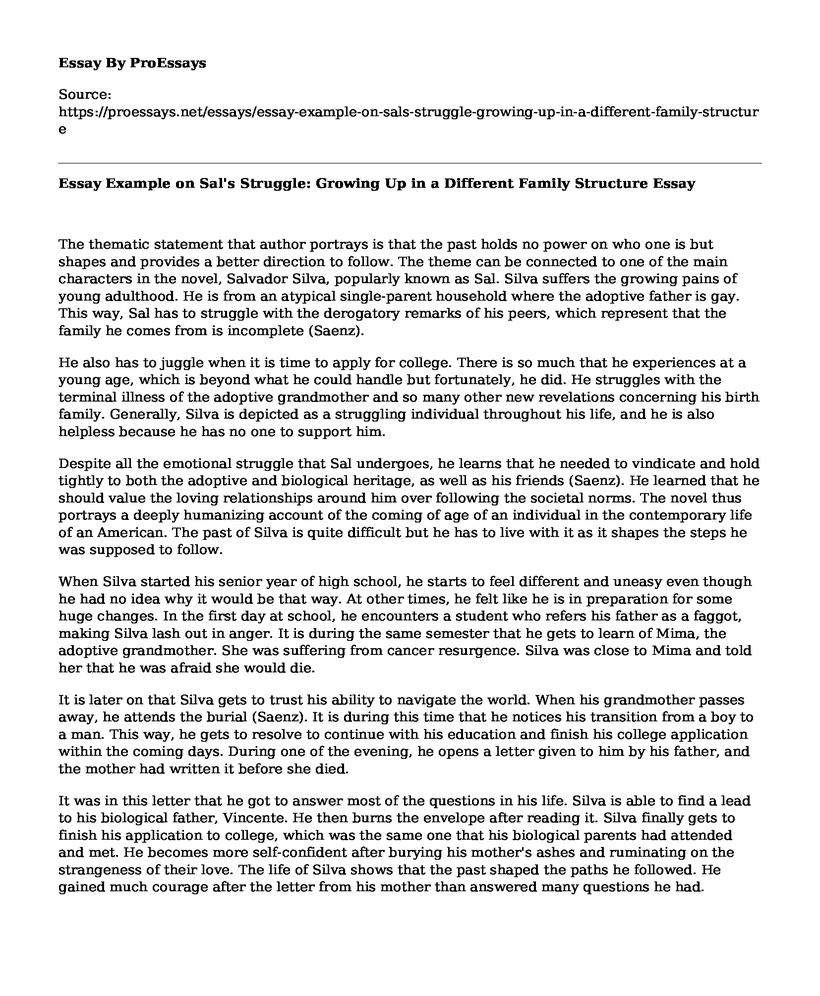The thematic statement that author portrays is that the past holds no power on who one is but shapes and provides a better direction to follow. The theme can be connected to one of the main characters in the novel, Salvador Silva, popularly known as Sal. Silva suffers the growing pains of young adulthood. He is from an atypical single-parent household where the adoptive father is gay. This way, Sal has to struggle with the derogatory remarks of his peers, which represent that the family he comes from is incomplete (Saenz).
He also has to juggle when it is time to apply for college. There is so much that he experiences at a young age, which is beyond what he could handle but fortunately, he did. He struggles with the terminal illness of the adoptive grandmother and so many other new revelations concerning his birth family. Generally, Silva is depicted as a struggling individual throughout his life, and he is also helpless because he has no one to support him.
Despite all the emotional struggle that Sal undergoes, he learns that he needed to vindicate and hold tightly to both the adoptive and biological heritage, as well as his friends (Saenz). He learned that he should value the loving relationships around him over following the societal norms. The novel thus portrays a deeply humanizing account of the coming of age of an individual in the contemporary life of an American. The past of Silva is quite difficult but he has to live with it as it shapes the steps he was supposed to follow.
When Silva started his senior year of high school, he starts to feel different and uneasy even though he had no idea why it would be that way. At other times, he felt like he is in preparation for some huge changes. In the first day at school, he encounters a student who refers his father as a faggot, making Silva lash out in anger. It is during the same semester that he gets to learn of Mima, the adoptive grandmother. She was suffering from cancer resurgence. Silva was close to Mima and told her that he was afraid she would die.
It is later on that Silva gets to trust his ability to navigate the world. When his grandmother passes away, he attends the burial (Saenz). It is during this time that he notices his transition from a boy to a man. This way, he gets to resolve to continue with his education and finish his college application within the coming days. During one of the evening, he opens a letter given to him by his father, and the mother had written it before she died.
It was in this letter that he got to answer most of the questions in his life. Silva is able to find a lead to his biological father, Vincente. He then burns the envelope after reading it. Silva finally gets to finish his application to college, which was the same one that his biological parents had attended and met. He becomes more self-confident after burying his mother's ashes and ruminating on the strangeness of their love. The life of Silva shows that the past shaped the paths he followed. He gained much courage after the letter from his mother than answered many questions he had.
Work cited
Saenz, Benjamin Alire. The Inexplicable Logic of My Life. Houghton Mifflin Harcourt, 2017.
Cite this page
Essay Example on Sal's Struggle: Growing Up in a Different Family Structure. (2023, Mar 12). Retrieved from https://proessays.net/essays/essay-example-on-sals-struggle-growing-up-in-a-different-family-structure
If you are the original author of this essay and no longer wish to have it published on the ProEssays website, please click below to request its removal:
- Compare and Contrast Essay Example: Diversity and LIS Education
- Enforcement of Surrogacy Contracts - Essay Sample
- Essay Sample on Museum Architecture
- The Voice of a Native American on the American Indian Movement
- The Diversity of Teachers Annotated Bibliography Paper Example
- Museums for Peace: Cultivating Peace & Awareness - Essay Sample
- Free Essay Example on Learning to Balance Work-Life, School & Family: Overcoming Time Management Obstacles







